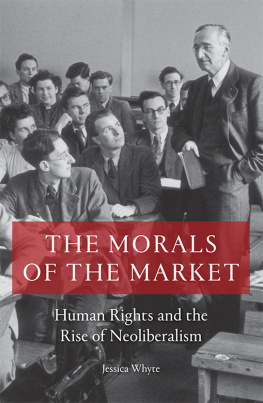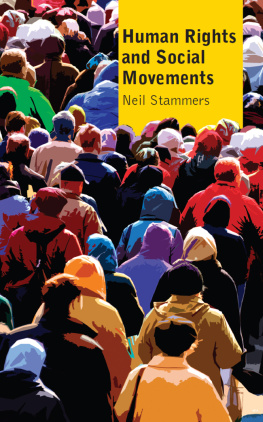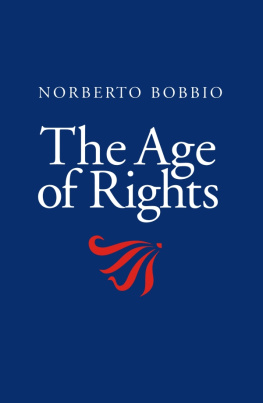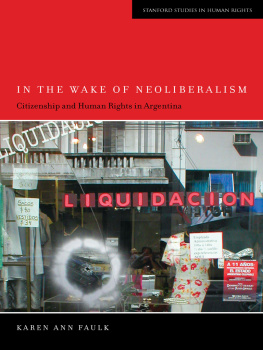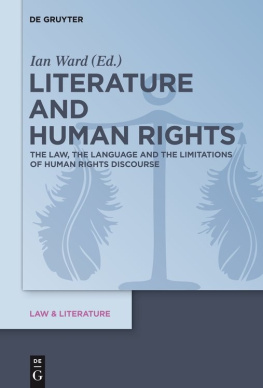Contents

The Morals of the Market
The Morals of the Market
Human Rights and the Rise of Neoliberalism
Jessica Whyte

First published by Verso 2019
Jessica Whyte 2019
All rights reserved
The moral rights of the author have been asserted
1 3 5 7 9 10 8 6 4 2
Verso
UK: 6 Meard Street, London W1F 0EG
US: 20 Jay Street, Suite 1010, Brooklyn, NY 11201
versobooks.com
Verso is the imprint of New Left Books
ISBN-13: 978-1-78663-311-8
ISBN-13: 978-1-78663-346-0 (LIBRARY)
ISBN-13: 978-1-78663-312-5 (UK EBK)
ISBN-13: 978-1-78663-313-2 (US EBK)
British Library Cataloguing in Publication Data
A catalogue record for this book is available from the British Library
Library of Congress Cataloging-in-Publication Data
A catalog record for this book is available from the Library of Congress
Typeset in Minion by Hewer Text UK Ltd
Printed and bound by CPI Group (UK) Ltd, Croydon CR0 4YY
For Ihab
Contents
Any free society presupposes, in particular, a widely accepted moral code. The principles of this moral code should govern collective no less than private action.
Draft Mont Plerin Society Statement of Aims, 1947
In the wake of 2017s devastating Grenfell fire, the leader of the British Labour Party, Jeremy Corbyn, sparked outrage by calling for the requisitioning of empty investment properties to house survivors of the incinerated apartment block. As the survivors slept out in churches, mosques and local halls, Corbyns call to appropriate land-banked houses challenged the sanctity of private property. Writing in The Times a month later, Conservative Party peer Daniel Finkelstein cited these events as reason to support the Human Rights Act. Comparing Corbyn to the former Venezuelan president, Hugo Chvez, he argued that this was exactly the reason we have human rights protection so people can secure their individual liberty in this case their right to property when the popular will is against them.Rather, human rights were necessary to protect a weak minority, Kensingtons absent property-owners, from the passions of the masses.
At least seventy-one people burned to death in Grenfell Tower. For the survivors, its burnt-out remains must be a bitter reminder of loved ones, family members, friends, neighbours. But Grenfell was not only a private catastrophe; it was also a deeply political, public one. Not only does it tell a contemporary tale of two cities, as Corbyn put it, referring to the mansions jutting up alongside neglected social-housing towers in the highly unequal borough; it also reveals the racialisation of poverty and vulnerability in a neoliberal period in which racial segmentation occurs as much through the impersonal, colour-blind operation of the market as through direct racial discrimination. The fire was not only a result of what the Grenfell Action Group had previously warned was the dangerous ineptitude and incompetence of the council, which had failed to install a sprinkler system or repair blocked fire-exits. The councils decision to clad the buildings faade to improve its appearance when viewed from wealthy surrounding areas and then to cut costs by opting for cheap, flammable cladding also played a role, as did the privatisation of fire-safety assessments and cuts to the fire service.
Faced with such inequality and neglect, it would be easy to dismiss Finkelsteins invocations of the human rights of investors as pure cynicism. Human rights, it is commonly supposed, embody a concern for human dignity that is deeply at odds with the imperatives of wealth accumulation, and are among the few weapons the most marginalised still have. Indeed, in the wake of the fire, a United Nations envoy announced that the UK might have breached its obligation to provide a human right to housing, and the independent Equality and Human Rights Commission appointed a panel of legal experts to examine whether the government had violated its obligations under the Human Rights Act. One year on, with little affordable housing in the borough,
However easy it is to dismiss the idea of Kensingtons absentee investors as the subjects of human rights, it is more difficult to demarcate a true human rights discourse from cynical appropriations of it. The human right to dominate exists alongside the human rights of the dominated, and human rights have often proved more useful in protecting the wealthy and legitimising the interventions of the most powerful states than in protecting the powerless.
The language of human rights is notoriously slippery, marked by a tactical polyvalence (in Michel Foucaults words) according to which the effect of identical formulations differs according to who is speaking, his position of power [and] the institutional context in which he happens to be speaking.
This book is an investigation of the historical and conceptual relations between human rights and neoliberalism. It has often been noted that the embrace of the language of human rights by leaders of Anglo-American and European states, and by a new generation of international human rights NGOs, took place in the late 1970s, just as governments also began to embrace neoliberalism. Attesting to this convergence, the award of the 1976 Nobel Prize in Economics to the Chicago Schools Milton Friedman was followed the next year by Amnesty Internationals 1977 Nobel Peace Prize. This book seeks to explain why these two revivals and reinventions of liberalism took place at the same time, and why their trajectories have been so intertwined ever since.
In attempting to understand this convergence, I follow the lead of many thinkers who have pointed to convergences and compatibilities between neoliberalism and human rights. Upendra Baxis pioneering work on trade-related market-friendly human rights traced attempts by major corporations to mobilise the normative force of human rights to defend the rights of capital.
In order to extend these observations, this book returns to another parallel history. Less well noted than the simultaneous rise of neoliberal and human rights in the 1970s is the fact that, in 1947, when, the UN Commission on Human Rights met for the first time at Lake Success to begin drafting an international bill of rights, a group of economists, philosophers and historians were gathered across the Atlantic in the Swiss Alpine village of Mont Plerin to consider the principles that could animate a new liberal order. The efforts of the first group resulted in the Universal Declaration of Human Rights (UDHR), which was conceived as a common standard of achievement for all peoples and all nations. The latter grouping founded the Mont Plerin Society (MPS), which has been aptly described as the neoliberal thought collective.
While most existing accounts of the relation between human rights and neoliberalism begin in the 1970s, I return to the 1940s to trace the development of neoliberal human rights thinking in the decades prior to the neoliberal ascendancy. In 1947, the divergences between those who drafted the UDHR and the neoliberals of Mont Plerin were more significant than their convergences. While both were concerned with threats to human dignity and liberty in the wake of World War II, their solutions differed markedly: the human rights delegates adopted an extensive list of social and economic rights, while the neoliberals depicted state welfare and planning as totalitarian threats to Western civilisation. My focus is on the ways in which neoliberal thinkers viewed the rise of human rights, and then mobilised and developed the language associated with them for their own ends. I suggest that a better understanding of the role of human rights in earlier neoliberal thinking can help us to understand their later convergence.

